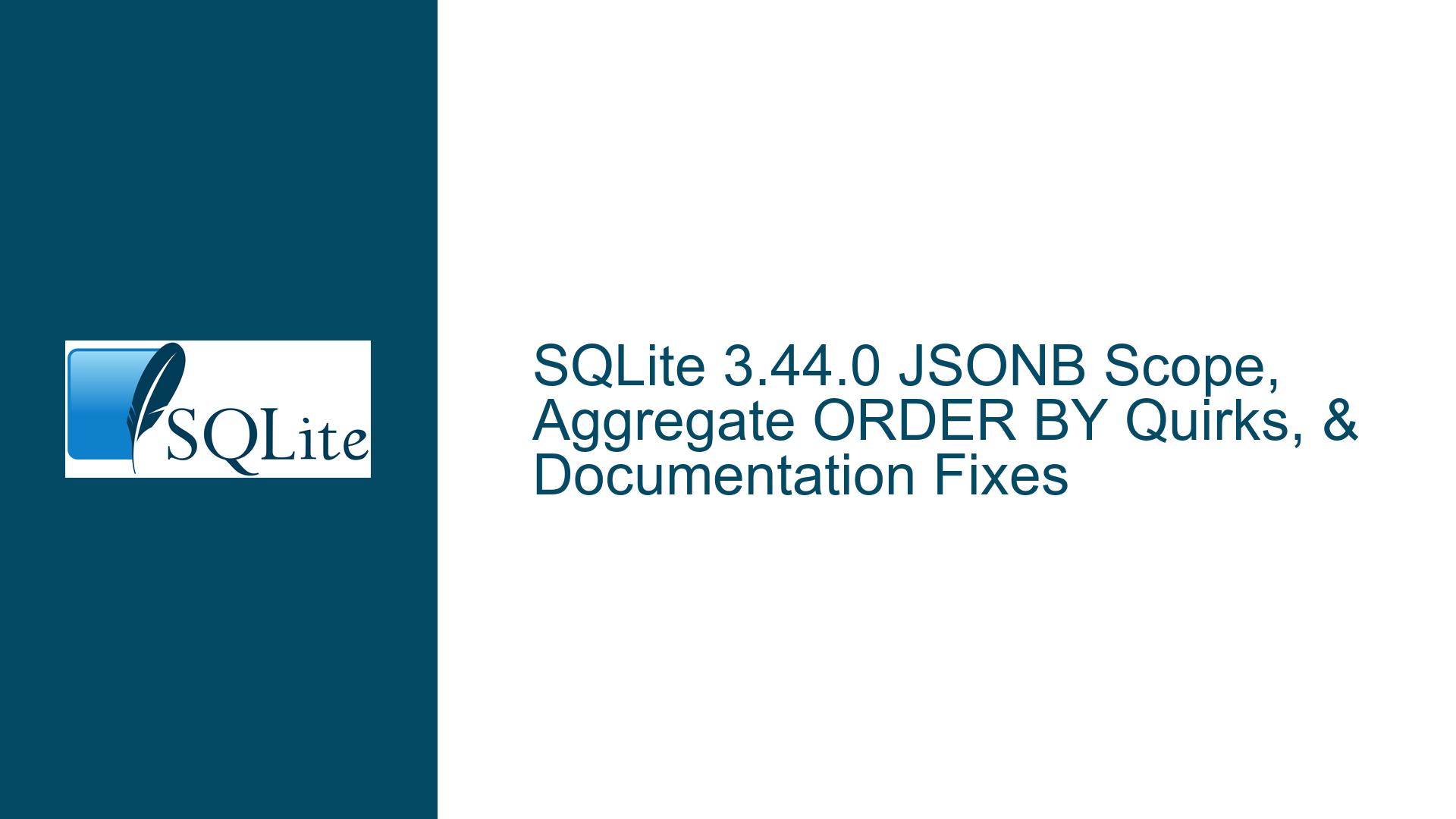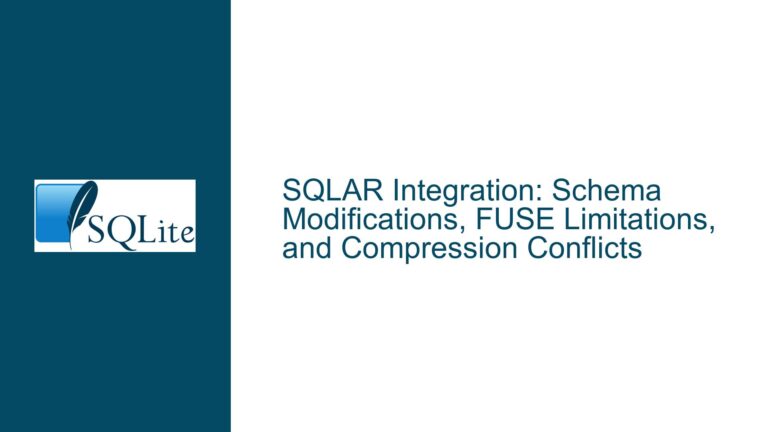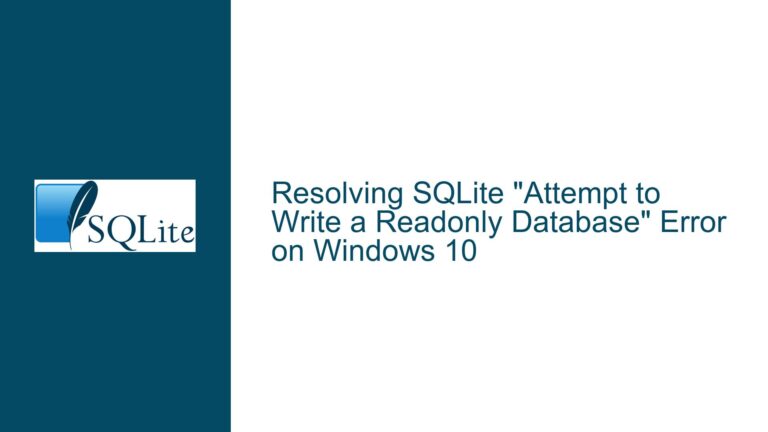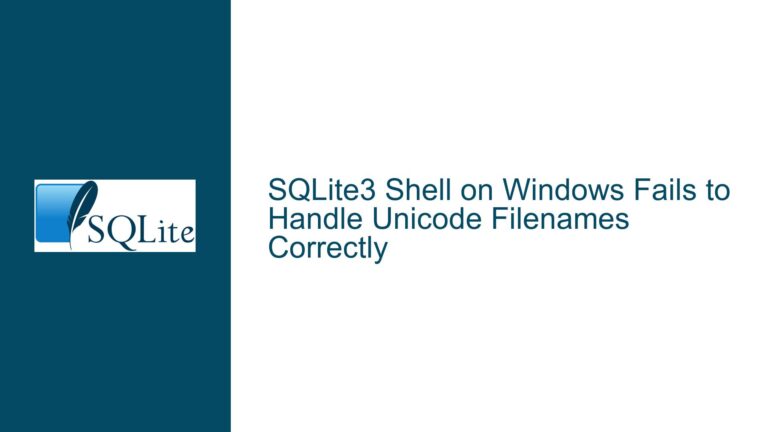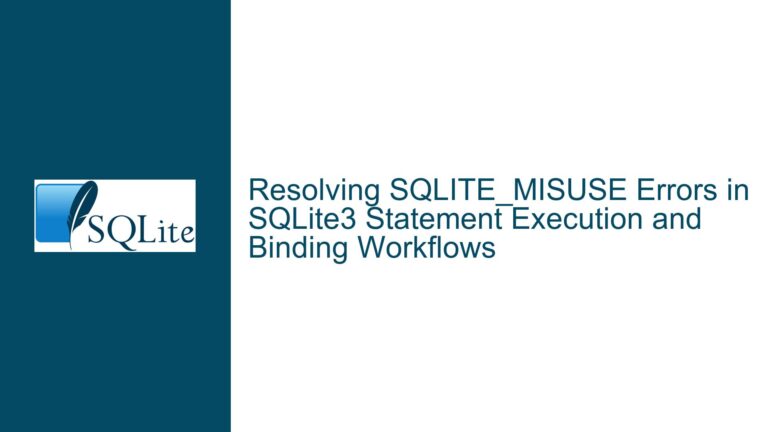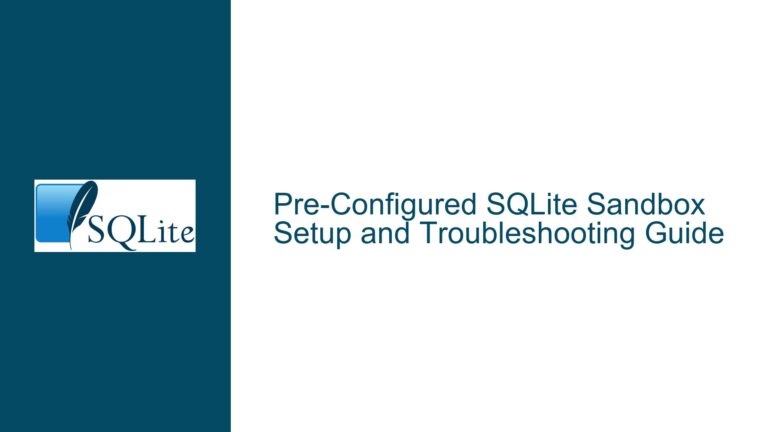SQLite 3.44.0 JSONB Scope, Aggregate ORDER BY Quirks, & Documentation Fixes
JSONB Implementation Scope and Usage Clarifications
The introduction of JSONB in SQLite 3.44.0 beta has sparked debates about its intended role. JSONB is a binary representation of JSON designed for efficient storage and processing within SQLite. However, confusion arose due to conflicting interpretations of its purpose. Users questioned whether JSONB should be treated as a public interchange format (like PostgreSQL’s jsonb) or strictly as an internal optimization layer.
Key points of contention include:
- Storage Stability: JSONB is stored in database files, making its format de facto public despite SQLite’s documentation labeling it as "private to SQLite." This creates tension between the desire for long-term stability and the claim that it is not an interchange format.
- Edge Interaction: Developers are uncertain whether applications should handle JSONB directly (e.g., via
jsonb(?)in prepared statements) or rely solely on SQLite’s built-in functions for conversion. The lack of explicit examples in preliminary documentation exacerbated this confusion. - String Delimiters: Ambiguity exists around whether JSONB payloads include string delimiters (
"), affecting how developers parse or construct JSONB values programmatically.
The SQLite team responded by updating JSONB documentation to clarify its role: JSONB is optimized for SQLite’s internal operations, and applications should interact with standard JSON at the edges, using functions like json() and jsonb() for conversions. However, the community remains skeptical about long-term compatibility if third-party tools adopt JSONB as an interchange format.
Aggregate ORDER BY and DISTINCT Interaction Anomalies
The new ORDER BY clause support for aggregate functions introduced unexpected behavior when combined with DISTINCT. Users observed that the order of operations—sorting before deduplication—led to counterintuitive results. For example:
SELECT group_concat(DISTINCT name ORDER BY type) FROM mf;
produced varying counts of distinct name values depending on the ORDER BY expression. This contradicts expectations that DISTINCT should operate independently of sorting.
Root Causes:
- Execution Order: SQLite processes
ORDER BYbefore applyingDISTINCTwithin the aggregate function. This means sorting influences which rows are considered for deduplication, unlike standardSELECT DISTINCTqueries where deduplication precedes ordering. - PostgreSQL Compatibility: PostgreSQL restricts
ORDER BYin aggregates to columns included inDISTINCT, preventing such anomalies. SQLite’s more flexible implementation allows ordering by unrelated columns, leading to unintended side effects. - Ambiguous Documentation: The documentation initially lacked clarity on how
DISTINCTandORDER BYinteract in aggregates, leaving users to infer behavior from experimentation.
These quirks were initially defended as intentional features but later adjusted in response to community feedback. The revised behavior in subsequent builds aligns more closely with PostgreSQL’s constraints, prohibiting ORDER BY expressions unrelated to DISTINCT arguments.
Resolving Compilation Errors, Documentation Typos, and Function Naming
Compilation Error in shell.c
A Windows build failure occurred due to an undeclared variable console_utf8 in shell.c. This stemmed from a commit intended to remove unused variables, inadvertently breaking platform-specific console handling. The fix involved restoring conditional compilation guards for Windows, ensuring console_utf8 is declared only where needed.
Documentation Revisions
- Typo Corrections: Instances of "GEOPLOY" were corrected to "GEOPOLY," and "subsqueries" to "subqueries."
- strftime Clarifications: The
%Hmodifier was erroneously described as "1–12 without leading zero"; this was updated to reference%I(12-hour format). - concat_ws Explanation: Added explicit notation that "_ws" stands for "with separator," aligning with PostgreSQL/MySQL terminology.
Function Naming Feedback
While concat_ws() follows industry standards, users suggested alternative names like concat_sep() for clarity. SQLite maintainers emphasized adherence to existing conventions to ease migration from other databases but acknowledged the value of supplementary documentation.
Troubleshooting Steps, Solutions & Fixes
JSONB Usage Guidelines
- Input/Output Handling:
- Use
jsonb(?)in prepared statements to convert application-layer JSON strings to JSONB. - Retrieve JSON via
json():SELECT json(jsonb_column) FROM table;
- Use
- Schema Design:
- Prefer
JSONBfor columns requiring frequent partial updates or binary storage efficiency. - Use standard
JSONfor compatibility with external tools.
- Prefer
- Migration Strategy:
- Gradually convert existing
JSONcolumns toJSONBusingALTER TABLEandjsonb():UPDATE table SET jsonb_column = jsonb(json_column);
- Gradually convert existing
Aggregate ORDER BY and DISTINCT Best Practices
- Restrict ORDER BY Columns:
- Ensure
ORDER BYexpressions are functionally dependent onDISTINCTarguments. For example:SELECT group_concat(DISTINCT name ORDER BY name DESC);
- Ensure
- PostgreSQL Compatibility Mode:
- Enable strict checks (if available) to enforce
ORDER BYalignment withDISTINCT.
- Enable strict checks (if available) to enforce
- Subquery Workaround:
- Isolate
DISTINCToperations in subqueries before applying aggregates:SELECT group_concat(name ORDER BY type) FROM (SELECT DISTINCT name FROM mf);
- Isolate
Fixing Compilation and Documentation Issues
- Windows Build Fix:
- Apply the following patch to
shell.cto conditionally declareconsole_utf8:#ifdef _WIN32 static int console_utf8 = 0; #endif
- Apply the following patch to
- Documentation Updates:
- Refresh local documentation copies from SQLite’s draft site post-3.44.0 release.
- Monitor the release checklist for real-time status.
xIntegrity Method Enhancements
- Error Messaging:
- Prefix virtual table integrity errors with module/table names using
sqlite3_vtab_config().
- Prefix virtual table integrity errors with module/table names using
- Check Type Parameter:
- Differentiate between
PRAGMA quick_checkandPRAGMA integrity_checkby extendingxIntegrity:int (*xIntegrity)(sqlite3_vtab *pVTab, int check_type, char **pzErr);
- Differentiate between
- Documentation Sync:
- Update
sqlite3_modulestruct definitions to include parameter names for clarity.
- Update
This guide synthesizes critical insights from the SQLite 3.44.0 beta discussion, providing actionable solutions to navigate its new features and pitfalls. By addressing JSONB’s role, aggregate quirks, and documentation gaps, developers can adopt this release confidently while mitigating unintended behavior.
